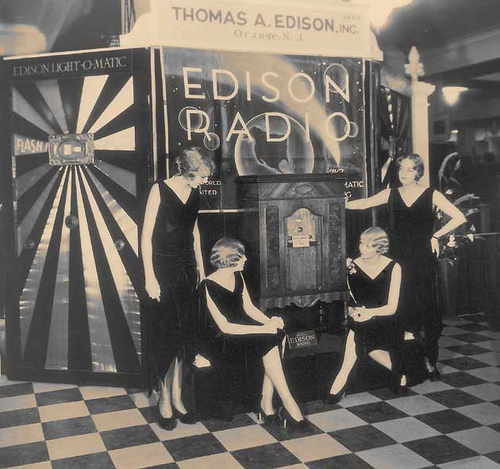Radio was a big industry, because it was the cheapest way to get access to different programs. Once the equipment was purchased, listening to programs was free.

"The shut-in's Sunday service," Clark Music Co., 1923
"It was in the 1920s, when nobody had time to reflect, that I saw a still-life painting with a flower that was perfectly exquisite, but so small you really could not appreciate it."
~ Georgia O'Keeffe
The United States of America during the 1920's was a time of economic growth and many changes.

A street in Harlem’s shopping district during the 1930’s. Photo by PhotoQuest/Getty Images.
After World war 1, a lot of Jazz musicians migrated from the south to major cities such as Chicago and New York, -looking for a better life, far from racial violence and segregation- making it possible to spread jazz all over the country, leaving controversy and charm along the way. As the 20th century progressed, Jazz rose in popularity. Even though each time this happened it was also more criticized. Finally, Jazz survived and helped to generate a cultural shift.

Promotional image for Edison Radio from the 1926 New York Radio World’s Fair

Photograph of the Brox Sisters, a popular singing trio, listening to the radio together in the mid 1920s
New ways of consumerism started to emerge and citizens started to buy goods. One of those goods was the radio, which next to the migration helped to spread Jazz all over the country.
Radio was a big industry, because it was the cheapest way to get access to different programs. Once the equipment was purchased, listening to programs was free.

"The shut-in's Sunday service," Clark Music Co., 1923

Radio broadcasting began in earnest in 1920, when Westinghouse launched the first programmed broadcast of a radio station.
The first decade of radio broadcasting in the United States coincided with the fabled "Jazz age" which had a big influence in both races (white and Black Americans). When the National Broadcasting Company made it possible for citizens of New York and California to listen to the same program simultaneously, white, middle-class americans could turn to African American culture, breaking the old-fashioned victorian moral codes of their parents, identifying themselves as "White Negroes"